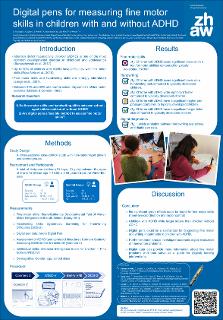Please use this identifier to cite or link to this item:
https://doi.org/10.21256/zhaw-25701| Publication type: | Conference poster |
| Type of review: | No review |
| Title: | Digital pens for measuring fine motor skills in school-aged children with and without ADHD |
| Authors: | Truninger, Dominique Zysset, Annina Wehrli, Samuel Albermann, Kurt von Rhein, Michael Wieber, Frank |
| et. al: | No |
| DOI: | 10.21256/zhaw-25701 |
| Conference details: | 4. Digital Health Lab Day, Winterthur, Schweiz, 12. September 2022 |
| Issue Date: | 19-Sep-2022 |
| Publisher / Ed. Institution: | ZHAW Zürcher Hochschule für Angewandte Wissenschaften |
| Language: | English |
| Subjects: | Children and youth public health; Health of children and adolescents; Attention deficit hyperactivity disorder (ADHD); Fine motor skills; Digital pen; Handwriting skills |
| Subject (DDC): | 618.92: Pediatrics |
| Abstract: | Objective: Attention-deficit/hyperactivity disorder (ADHD) represents a major public health issue with a broad range of negative outcomes for the affected individuals and with a serious social and financial burden to families and society. More than 50% of children with ADHD suffer from impaired handwriting (HW). Impaired HW and fine motor (FM) skills lead to emotional frustration and interfere with the ability to demonstrate knowledge or complete school work. Given this importance of FM and HW skills, reliable, valid and easily applicable methods to measure these skills are particularly relevant. Digital innovations offer opportunities to address this problem. A promising tool are digital pens that can measure graphomotor parameters such as stroke size pressure and writing speed. This pilot study aims to test the feasibility of automatically assessing HW and visuo-motor skills via digital pens and to investigate differences in graphomotor parameters between children with and without an ADHD diagnosis. Method: In this cross-sectional-case-control-study, 31 children with ADHD (𝑛𝐴𝐷𝐻𝐷=15) and without ADHD (𝑛𝐶𝑜𝑛𝑡𝑟𝑜𝑙=16) aged between 8 and 12 years were recruited. All children completed a paper-pencil test measuring FM skills (Beery-VMI) and a HW test (SOS-2) where the children had to copy a given text using a digital pen. Using adjusted multiple linear regression analyses with bootstrapping method, the influence of group on individual test scores (Beery-VMI and SOS-2) and on digital pen data was evaluated. Age, intelligence, and gender were used as covariates for the model. Correlations between HW skills (SOS-2) and digital pen data were computed. Results: The group variable does not seem to have a statistically significant effect on FM skills (Beery-VMI). No significant association between group and quantity of HW (SOS-2) were found. Significant group differences were found in the quality of HW as well as in the average letter sizes. HW speed and letter size from children with ADHD are significantly increased compared to the control-group. Strong correlations were found between some items of the SOS-2 and the digital pen data. Conclusion: Digital pens are a feasible method to assess FM and HW skills. Measuring FM skills and HW digitally could be a complementary tool in the ADHD assessment. Digital data can also provide more information about FM problems and thus serve as a guide for (digital) training interventions. |
| URI: | https://digitalcollection.zhaw.ch/handle/11475/25701 |
| Fulltext version: | Published version |
| License (according to publishing contract): | Licence according to publishing contract |
| Departement: | School of Health Sciences Life Sciences and Facility Management Social Work |
| Organisational Unit: | Institute of Computational Life Sciences (ICLS) Institute of Public Health (IPH) |
| Published as part of the ZHAW project: | Fine motor skills in school-aged Children with ADHD: A case-control study using digital pens (FAST) |
| Appears in collections: | Publikationen Gesundheit |
Files in This Item:
| File | Description | Size | Format | |
|---|---|---|---|---|
| 2022_Truninger-etal_Penstudy_DigitalHealthLabDay2022-Poster.pdf | 2.84 MB | Adobe PDF |  View/Open |
Show full item record
Truninger, D., Zysset, A., Wehrli, S., Albermann, K., von Rhein, M., & Wieber, F. (2022, September 19). Digital pens for measuring fine motor skills in school-aged children with and without ADHD. 4. Digital Health Lab Day, Winterthur, Schweiz, 12. September 2022. https://doi.org/10.21256/zhaw-25701
Truninger, D. et al. (2022) ‘Digital pens for measuring fine motor skills in school-aged children with and without ADHD’, in 4. Digital Health Lab Day, Winterthur, Schweiz, 12. September 2022. ZHAW Zürcher Hochschule für Angewandte Wissenschaften. Available at: https://doi.org/10.21256/zhaw-25701.
D. Truninger, A. Zysset, S. Wehrli, K. Albermann, M. von Rhein, and F. Wieber, “Digital pens for measuring fine motor skills in school-aged children with and without ADHD,” in 4. Digital Health Lab Day, Winterthur, Schweiz, 12. September 2022, Sep. 2022. doi: 10.21256/zhaw-25701.
TRUNINGER, Dominique, Annina ZYSSET, Samuel WEHRLI, Kurt ALBERMANN, Michael VON RHEIN und Frank WIEBER, 2022. Digital pens for measuring fine motor skills in school-aged children with and without ADHD. In: 4. Digital Health Lab Day, Winterthur, Schweiz, 12. September 2022. Conference poster. ZHAW Zürcher Hochschule für Angewandte Wissenschaften. 19 September 2022
Truninger, Dominique, Annina Zysset, Samuel Wehrli, Kurt Albermann, Michael von Rhein, and Frank Wieber. 2022. “Digital Pens for Measuring Fine Motor Skills in School-Aged Children with and without ADHD.” Conference poster. In 4. Digital Health Lab Day, Winterthur, Schweiz, 12. September 2022. ZHAW Zürcher Hochschule für Angewandte Wissenschaften. https://doi.org/10.21256/zhaw-25701.
Truninger, Dominique, et al. “Digital Pens for Measuring Fine Motor Skills in School-Aged Children with and without ADHD.” 4. Digital Health Lab Day, Winterthur, Schweiz, 12. September 2022, ZHAW Zürcher Hochschule für Angewandte Wissenschaften, 2022, https://doi.org/10.21256/zhaw-25701.
Items in DSpace are protected by copyright, with all rights reserved, unless otherwise indicated.